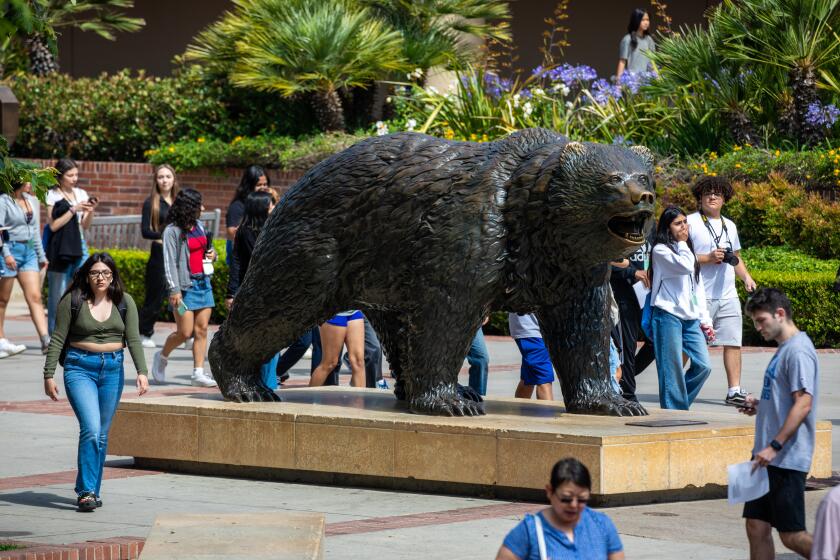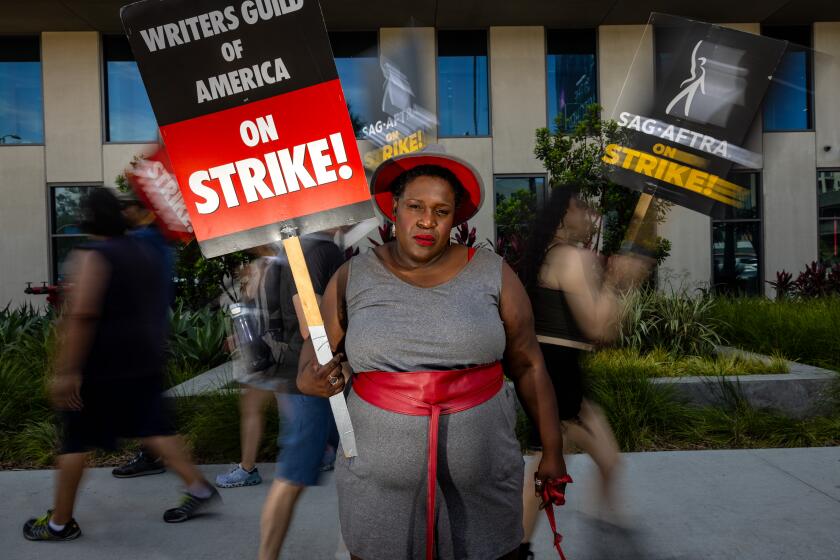
- Share via
A slow burn is rising in Karen Magaña’s throat, though this isn’t what she focuses on.
Not the noise of a low-flying plane drowning out her chants. Not the beads of sweat collecting on the bridge of her nose as she marches outside of the Inglewood Shine N Brite carwash, hoisting a sign that reads “Support Carwashers.”
Magaña fixes her gaze on the carwash: The older men, most immigrants from Latin America, hunch over cars as they polish, vacuum and scrub at a business the state cited last year for paying far below minimum wage. They remind Magaña of her brother-in-law, who first worked at a carwash when he came to the U.S. in 2008 without legal status. He felt lucky to make $60 a day. Her sister’s father-in-law worked the same job, passing out once after toiling under the sun.
For Magaña, a UCLA graduate student, this summer afternoon at Shine N Brite ran deeper than a single day of activism. It was a glimpse into a potential career as a labor organizer. She is one of 134 students participating in the University of California’s inaugural Labor Summer, an immersive paid fellowship, a boot camp of sorts, where picket lines have been their classrooms and learning how to yell from their stomachs was an assignment.
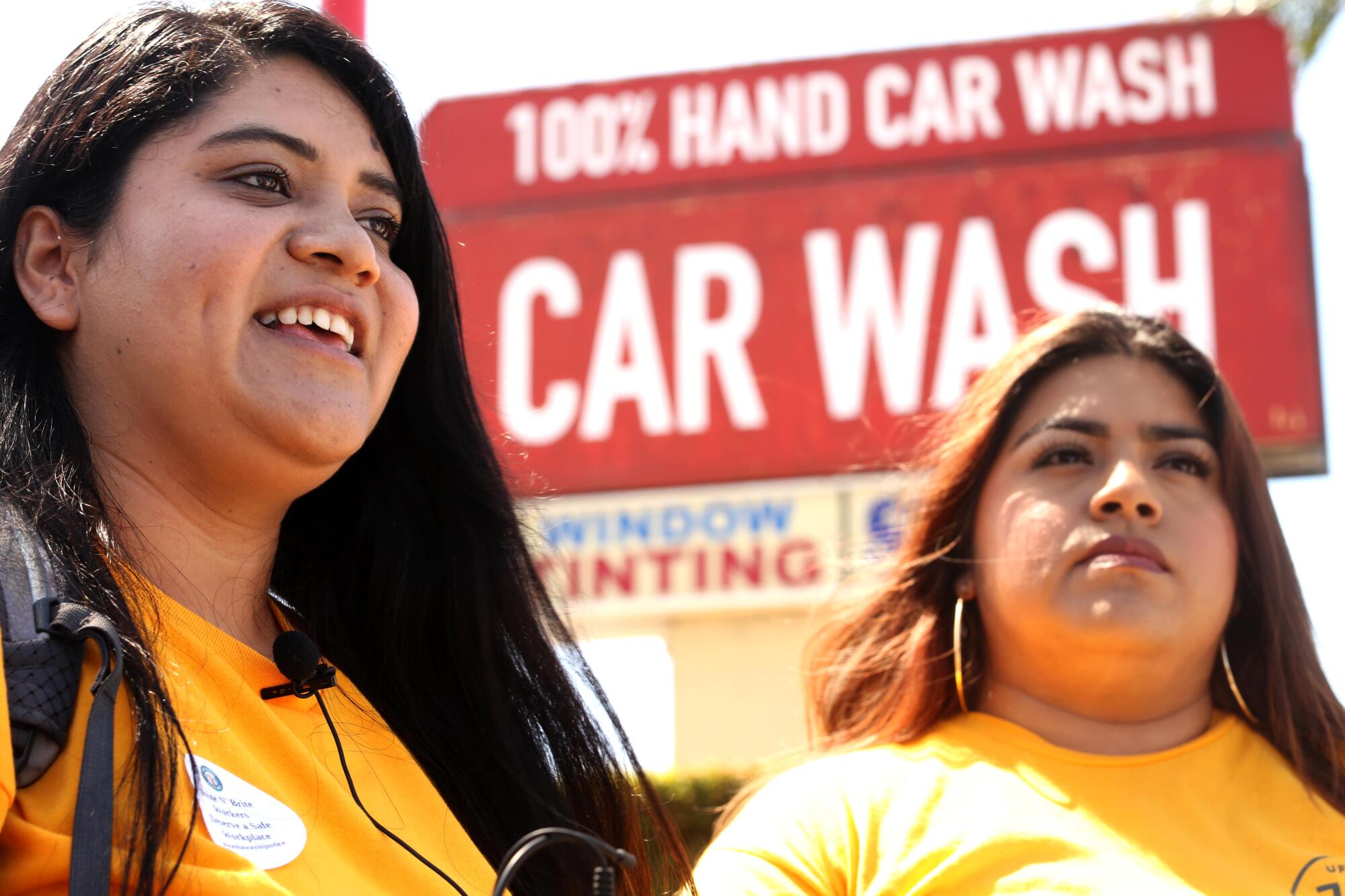
The fellows are experiencing a real-time look at labor unrest during a hot summer of activism like no other, with hotel workers, screen writers and actors all on strike and city workers staging a one-day walkout Tuesday. Many have also found work that speaks to their families’ experiences and struggles in the labor force. They see their mother, father, relatives in the faces of those they encounter on picket lines — and it has fueled their sense of mission.
“This isn’t me learning about other people, but me learning about myself and how to better support my family,” said Abril Olalde, a UCLA rising senior, of the workers she has encountered. “How do I help them find their way and make sure they’re not getting taken advantage of?”
The work is part of the UC’s major expansion of its labor studies programs with the opening of six campus-based labor centers this spring, backed by $13 million in state funding supported by lawmakers including Sen. María Elena Durazo (D-Los Angeles), a longtime labor leader. All nine undergraduate campuses now have a center.
The UC admitted a record number of California first-year students for fall 2023, led by Latinos and an increase in Native Americans who helped make up the largest ever group of underrepresented students offered admission.
The goal? To usher in a new generation of college-educated workers, equipped with a knowledge of labor rights that can reshape their workplaces and support California’s labor movement for years to come.
Support for unions among college graduates has hovered around 70% in the last few years, according to Gallup. Increasing economic inequalities, the pandemic and social justice movements have brought on among young adults “a clarity … that there are very few illusions that somehow the system is really working in their interest,” said Kent Wong, director of UCLA’s labor center.
At UCLA, which opened its labor center in 1964, most students are first generation, female, or students of color. As of July, there are 200 labor studies majors and minors at UCLA. Almost every class Wong teaches fills to capacity.
Wong said the centers offer a place in California higher education to examine the issues of working people, in a UC system with six business schools that have more than 1,000 faculty members.
At UC Irvine, which opened its labor center in March, Director Virginia Parks hopes to break down barriers between local unions and academia.
“These are students whose parents are at the front lines of the low wage workforce ... They’re educated but also they’re closely connected to this experience of economic struggle,” Parks said. “That’s pivotal.”
A lesson in ‘unlearning’
After the carwash rally, Magaña and Olalde made their way back to the organizing offices at United Food and Commercial Workers Local 770, the union that represents workers in grocery, retail, health, packing and cannabis in California. It was time for the debrief. Magaña said she was interviewed in Spanish by Telemundo.
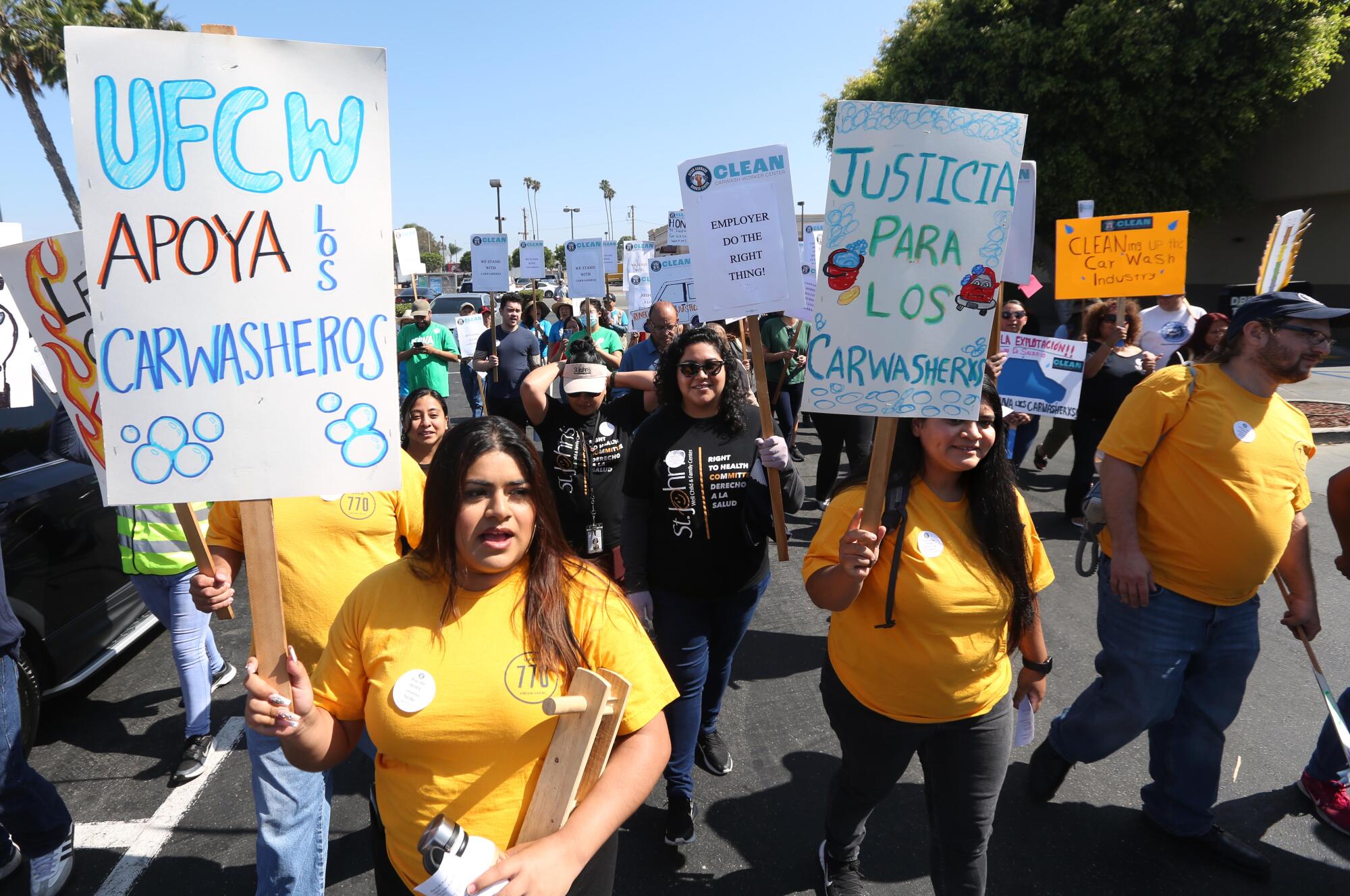
“I was just thinking that my parents could be watching this,” she said.
Magaña, 27, has never done organizing work or taken a labor studies class. But she grew up watching her mother feverishly work as a lone cook during shifts at Jack in the Box for more than a decade. She finally quit in June. Still, when her mother carries Magaña’s 2-year-old son, James, her arms ache from years of physical labor.
Her dad works at a furniture warehouse, packing boxes and loading trucks. But the long hours have caught up with him too. Two years ago, his knees started throbbing. Now they hurt whenever he walks.
“He just thinks that’s how it is, that’s how the working conditions are because he’s undocumented,” she said.
This summer, she wanted to learn how she could change his mind-set.
Olalde, who studies political science, said she experienced an “epiphany moment” on the first day of her internship at a hotel workers’ protest.
When an elderly woman spoke in Spanish about how low wages and the city’s expensive housing had forced her to move farther away, Olalde started tearing up — she saw flashes of her own mother, who works the night shift at a warehouse as an embroidery operator.
“She was so eloquently spoken. Like my mom,” she said. “My mom’s smart, but she doesn’t think she’s smart in English.”
Olalde quickly realized that the labor movement was a cause baked into her identity as a working-class Latina.
She describes the internship as a practice in “unlearning.” Watching actors go on strike, for example, subverted her belief that unions were only for blue-collar workers.
“We’re teaching people how to represent themselves. We’re not saviors of our community,” Olalde reflected.
Four actors on why they’re striking and the struggle to maintain a middle-class living in today’s Hollywood.
Which is why, on a recent afternoon, Magaña and Olalde stood in the wine section of a Pavilions in Burbank, waiting to interview Gerald Gates, 59, an in-store sommelier, for a video testimonial about how the planned merger of two of the largest supermarket chains in the country, Kroger and Albertsons, will affect workers. The video will support the Stop the Merger campaign, a group of unions and advocacy groups that argue that the merger will result in thousands of lost jobs.
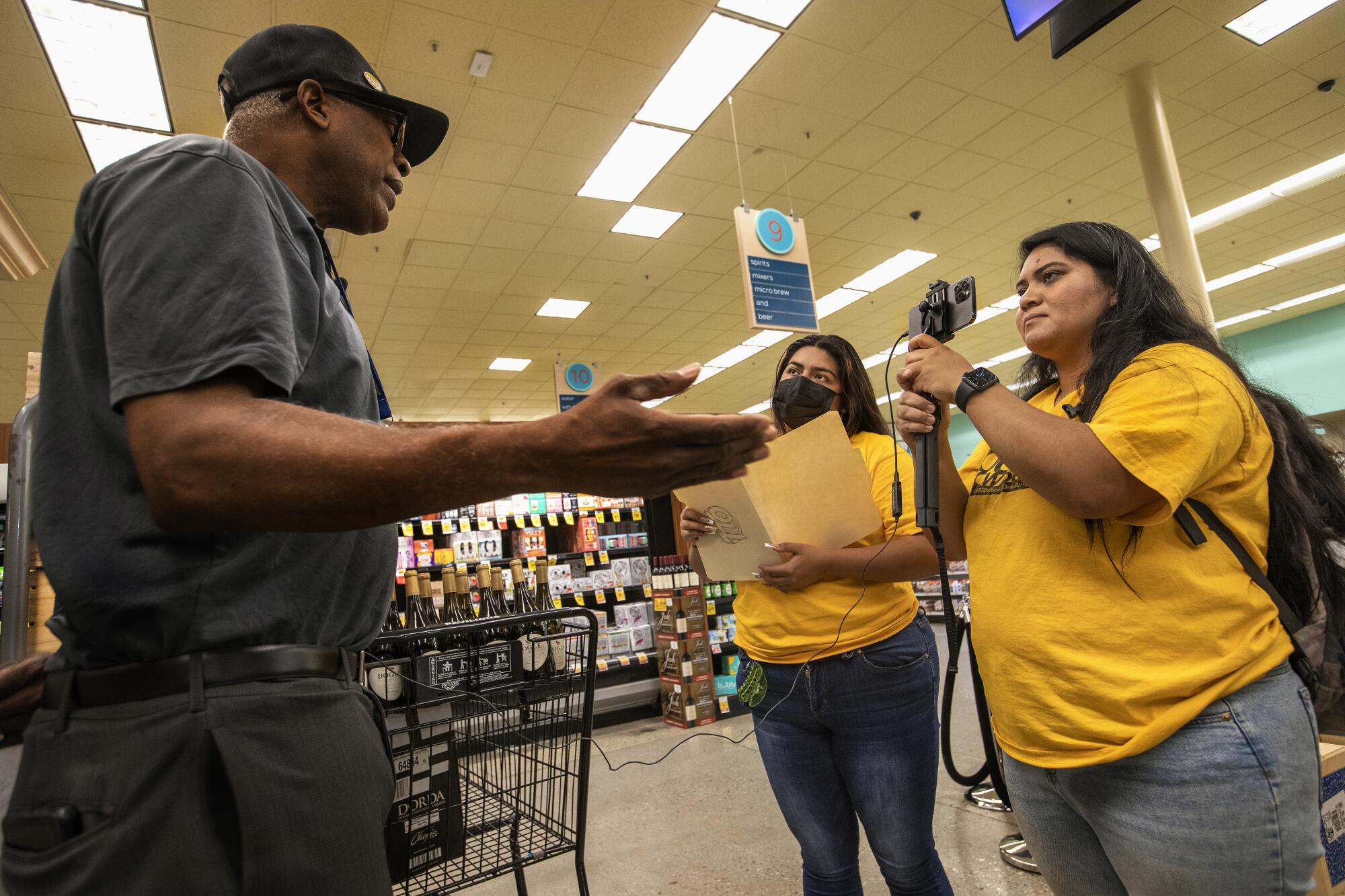
For a moment in the grocery store, Olalde remembers what grown-ups used to tell her: If you don’t go to college, this is where you’ll end up.
This too, she realizes, is a lesson to unlearn.
Gates tells her his paychecks support himself and his daughters, that he’s worked there for 11 years and hopes to stay for more. “I love what I do. I love my job,” he said, fearing the merger will lead to job losses.
“You didn’t really see [working at a grocery store] as something you want to do,” Olalde said. “And now I understand that not everyone could do this — the meat counter, the bakery, the wine.”
For Deidre Reyes, who graduated from UC Riverside’s master’s of public policy program this spring, the spike in labor activism coinciding with her fellowship at the United Domestic Workers of America confirmed that she was “in the right place at the right time.”
“I always have these thoughts in my head: Am I doing the right thing? Are you sure you’re doing the work that you were put on Earth to do?” she said.
As a data analyst intern, she collects data from the Bureau of Labor Statistics and the U.S. Census website to glean information about in-home support care workers in California. Reyes realized that if nursing assistants and home care providers were to go on strike, her collected data would be essential to help them organize more effectively.
A new generation
Training a new generation of labor organizers holds a dual importance — as program organizers are simultaneously meeting the needs of the moment and anticipating the future.
“We’re seeing workers mobilize at rates that we haven’t seen in a long time. Every other week it feels like there is an action for [our interns] to go to,” said Maricruz Ceceña, UFCW 770’s organizing director.
Without Magaña and Olalde, the union wouldn’t have had the bandwidth to conduct video interviews for the Stop the Merger campaign, Ceceña said.
But she’s also trying to ensure that their involvement in labor activism doesn’t end with their fellowship graduation Friday. She’s seen how the younger generation “injects a lot of energy” into organizations.
They provide fresh perspectives, a reminder that the labor movement is not just one of strife, but of joy too. Whenever UFCW 770 has interns, picket signs are always hand-drawn, she said. New music fills the offices. Reminders to “take care of yourself” are not just commented, but practiced.
“You get some of the things that we forget to do because we’re so used to charging and moving forward all the time,” she said.
As for Magaña, she shares what she’s learned with her family each evening. She tells her mom about how hotel workers on strike are chanting in Spanish and promises that people will still listen to her experience even if she doesn’t speak English. She teaches her nephews chants and urges her 12-year-old niece to write stories about her parents’ work.
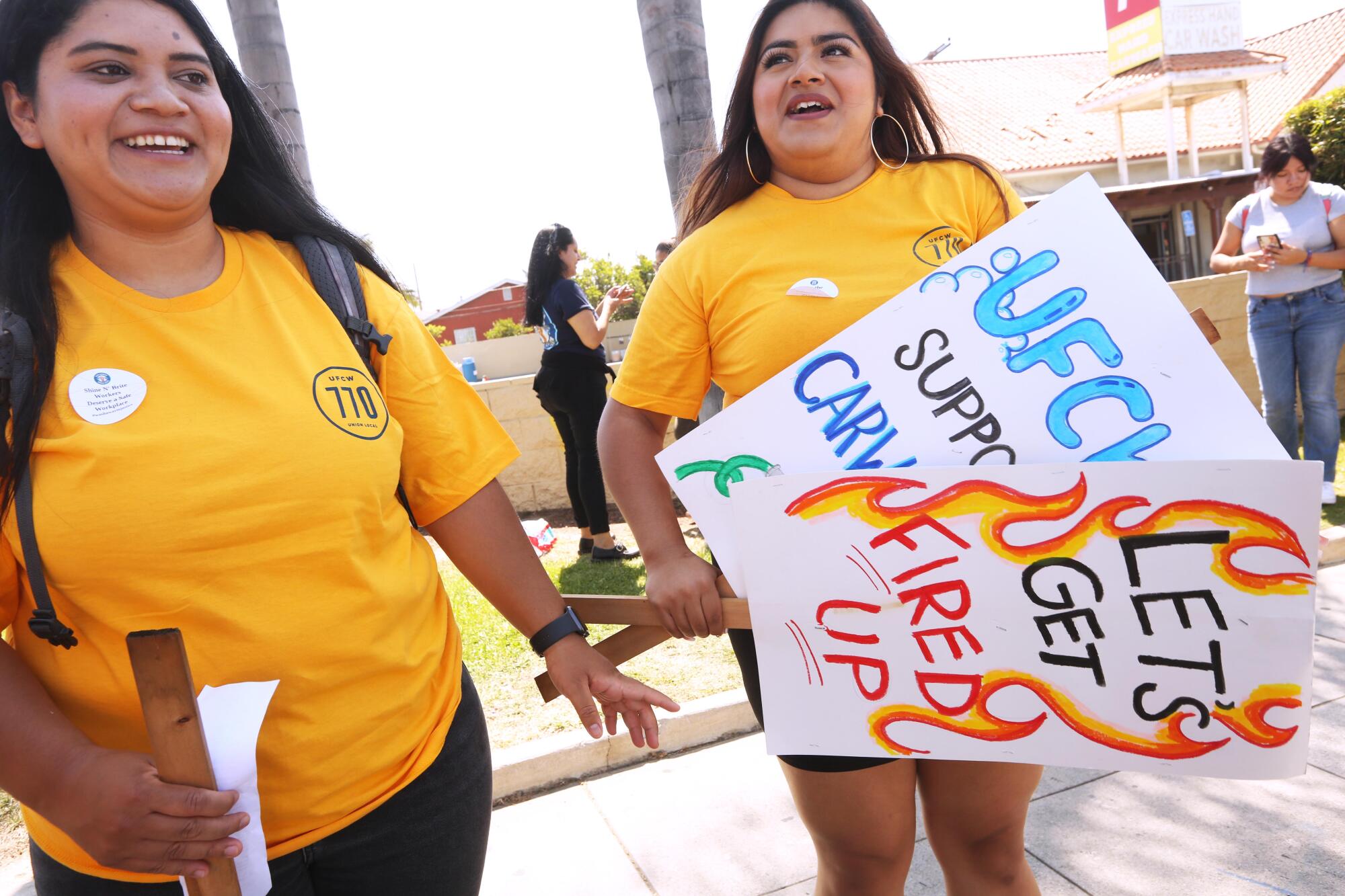
She’s still working to change her father’s mind. When a wooden plank fell on him a few weeks ago, bruising his arm, Magaña urged him to get it checked out. He brushed her aside, saying he didn’t want to make a big deal of it.
She knows he’s scared to lose his job. She’s unsure if he’ll ever see his working conditions the way she does.
But her summer experience, she said, has given her the confidence to keep trying: “Now I try to disagree with him all the time. I tell him how I see things. Hopefully, it’ll get through to him.”
More to Read
Sign up for Essential California
The most important California stories and recommendations in your inbox every morning.
You may occasionally receive promotional content from the Los Angeles Times.

